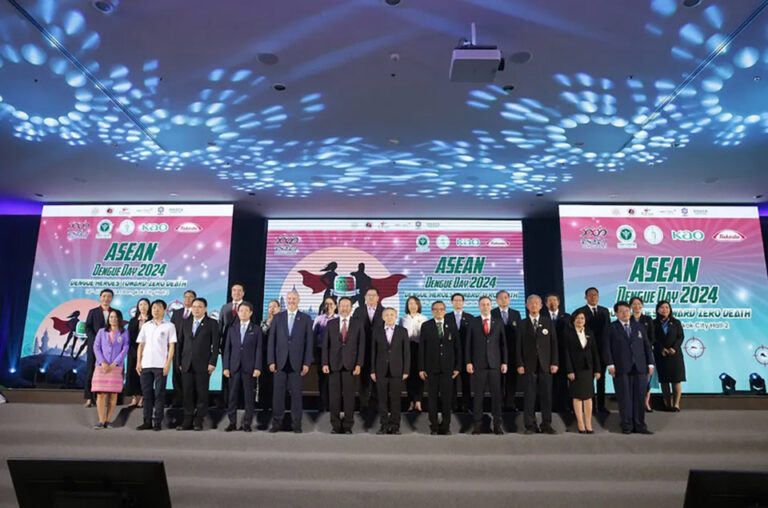The Department of Disease Control, Ministry of Public Health and Bangkok Metropolitan Administration (BMA) have teamed up with Kao Industrial (Thailand) Co., Ltd., Takeda (Thailand) Limited, and other partners including the Embassy of Japan in Thailand, National Electronics and Computer Technology Center (NECTEC, under NSTDA), Industrial Estate Authority of Thailand, Amata Corporation Plc., CP ALL Plc., and other Dengue-Zero MOU partners at ASEAN Dengue Day 2024, under the theme “Dengue Heroes towards Zero Death.” They aim to heighten public awareness of the dangers of dengue fever and promote protective measures, encouraging public participation in becoming “heroes” who disseminate dengue prevention guidelines to those around them, in line with the World Health Organization’s bid to achieve a zero-mortality rate by 2030. The event was held at Airawat Pattana Building, Bangkok City Hall, Din Daeng.
Dr. Thongchai Keeratihatthayakon, Director-General of the Department of Disease Control, Ministry of Public Health, spoke of a potential spike in dengue cases in Thailand, exacerbated by the El Niño phenomenon, which contributes to increased temperatures, rainfall, and humidity—ideal conditions for the breeding of Aedes mosquitoes, the carriers of dengue virus. From January to May 2024, nearly 30,000 dengue cases have been reported, with 29 deaths, and projections suggest up to 280 fatalities by year-end—the highest in five years. Beyond innovative prevention tools like the rapid dengue test (NS1) and Aedes egg traps, the ministry has formulated policies for accelerated dengue prevention across four key areas: (1) disease surveillance, (2) disease prevention and control, (3) diagnosis and treatment, and (4) risk communication. These guidelines are designed for governmental bodies and the general public to work together to permanently break the cycle of dengue fever. The ministry is calling for collective action from all sectors of the society. By becoming “heroes” in dengue prevention and disseminating dengue prevention guidelines simply to other people nearby, everyone would be helping to extend this crucial knowledge to an increasingly broader audience.
Dr. Chadchart Sittipunt, Governor of Bangkok, said, “Bangkok is susceptible to Aedes mosquito breeding owing to diverse conditions of its urban landscape. BMA has implemented proactive measures in community areas, schools, and places of worship. These include surveillance and eradication of mosquito breeding sites, environmentally oriented landscaping, large-scale cleaning days, and continuous community engagement. The general public as well as Bangkok Public Health Volunteers in all 50 districts—the social capillaries for knowledge distribution—are encouraged to observe the dengue prevention and control measures. Additionally, the BMA uses the LINE app to swiftly and effectively communicate risks and preventive measures for dengue to the public. In addition to the integrated approach to prevention, the mortality rate will decrease as planned if everyone is a dengue hero who makes sure their community keeps up with the society-wide journey in becoming dengue-zero.”
Mr. Yuji Shimizu, President of Kao Industrial (Thailand) Co., Ltd., said, “Kao is dedicated to enhancing Thai people’s quality of life and is aware of the dangers posed by dengue fever. For the third consecutive year, we have advanced the ‘GUARD OUR FUTURE’ project to safeguard people from mosquitoes. In the initial phase of the project, our focus was on collaborating with governmental bodies, the industrial sector, and educational institutions. This year, Kao has supported the research and development of the ‘Mosquito Bite Crowdsourcing’ feature within the ‘RooTan’ application enabling health-related risks alerts managed by NECTEC, NSTDA, and the Department of Disease Control. The app enables people to report mosquito situation in their areas—in their own neighborhoods, at work, or while doing anything anywhere across the country. The data thus reported aids in improving the detection of outbreaks as well as the prevention and control of dengue fever. Kao also places a high priority on the prevention of nationwide outbreaks and therefore continually provides mosquito repellent products to the Department of Disease Control to help reduce the spread of dengue fever. In the second phase of the project, Kao has focused on developing technologies for new products that offer protection from mosquitoes. This year, we have introduced a new, safety-focused innovation in mosquito repellent products that seamlessly integrates into one’s daily routines.”
Under the Dengue-zero partnership, the collaborating entities have diligently engaged with various sectors to collectively address the prevention of dengue fever and mitigation of associated risks. Furthermore, they have actively promoted community participation in prevention efforts, endorsed dengue control and prevention measures, and established a robust public communication platform through social media channels. Notably, this year’s campaign, titled “The Less You Know About Dengue, The More Protection You Need,” will feature rising star Win-Metawin Opas-iamkajorn as one of the “Dengue Heroes,” advocating for dengue prevention and immunization to enhance public awareness.
Mr. Peter Streibl, General Manager of Takeda (Thailand) Limited, said, “Takeda is committed to making Thailand a dengue-free society through collaboration with both public and private sectors. Our focus includes emphasizing the significance of dengue prevention measures, enhancing immunity among healthcare professionals, public health volunteers, teachers, and students in high-risk regions, and enhancing the country’s dengue reporting system for accuracy and promptness. Our objective is to decrease dengue outbreaks, illnesses, and fatalities through sustained partnerships and cooperation.” (NNT)


























